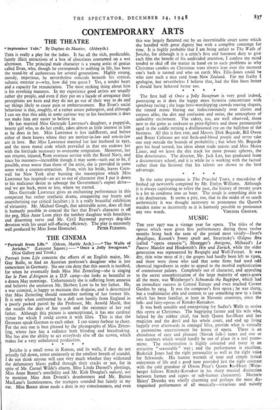THE CINEMA
"Portrait from Life." (Odeon, Marble Arch.)—" The Walls of Jericho." (Leicester Square.) — " Once a Jolly Swagman." (New Gallery and Tivoli.) Portrait from Life concerns the efforts of an English major, Mr. Guy Rolfe, to find an Austrian professor's daughter who is lost somewhere in Germany. No one can deny that this search is justified, for when he eventually finds Miss Mai Zetterling—she is singing Sur le Pont d'Avignon in a D.P. camp—she looks as beautiful as a dozen May mornings. Unfortunately she is. suffering from amnesia and believes the unshaven Mr. Herbert Lom to be her father. He, a war criminal, is happy to maintain this disguise, and is determined that Miss Zetterling should remember nothing of her former life. It is only when confronted by a doll sent hastily from England in a poorly packed parcel by the Professor, Mr. Arnold Mark, that she recalls the days of her youth and the existence of her real father. Although this picture is unexceptional, it has one cardinal virtue for which I could crown it with lilies. This is that the Germans speak German to each other. I can scarce forbear to cheer. For the rest one is best pleased by the photographs of Miss Zetter- ling, whose face has a radiance both blinding and breathtaking. She has also the ability to act everybody else off the screen, which
makes for a very unbalanced production. * * * * Jericho is a small town in Kansas, and its walls, if they do not actually fall down, totter ominously at the smallest breath of scandal. I do not think anyone will care very much whether they withstand the defamatory blasts puffed through their cracks or not, for in spite of Mr. Cornel Wilde's charm, Miss Linda Darnell's plottings, Miss Anne Baxter's sensibility and Mr. Kirk Douglas's naiveté, not to mention Miss Ann Dvorak's drunkenness and Mr. Barton MacLane's licentiousness, the trumpets sounded but faintly in my ear. Miss Baxter alone made a dent in my consciousness, and even this was largely flattened out by an interminable court scene which she handled with great dignity but with a complete contempt for time. It is highly probable that I am being unfair to The Walls of Jericho, for although it is a critic's first and foremost duty to give each film the benefit of his undivided attention, I confess my mind tended to skid off the matter in hand on to such problems as why Christmas candles on Christmas trees always lean over the moment one's back is turned and who on earth Mrs. Ellis-Jones could be who sent such a nice card from New Zealand. For my frailty I apologise, but nevertheless I believe that, had the film been better I should have behaved better too.
The first half of Once a Jolly Swagman is very good indeed, portraying as it does the happy mass hysteria concomitant with speedway racing ; the huge hero-worshipping crowds roaring slogans, the tinned music blaring out indiscriminately over clients and corpses alike, the dirt and confusion and noise, the atmosphere of unhealthy excitement. The riders, too, are well observed, those new to the game as cocksure as prize-fighters and those prematurely aged in the saddle turning a disillusioned eye on the ballyhoo of the business. All this is first rate, and Messrs. Dirk Bogarde, Bill Owen and Bonar Colleano are real flesh-and-blood people and never take one step outside the bounds of probability ; but when Mr. Bogarde gets his head turned, has ideas about trade unions and Miss Moira Lister, and we leave the dirt track for more prosaic spheres, the film deteriorates. The director, Mr. Jack Lee, has graduated from a documentary school, and it is while he is working with the factual rather than the fictional that his talents are shown to the best advantage. * - * * *
In the same programme is The Peaceful Years, a macedoine of hashed up newsreels compered by Mr. Emlyn Williams. Although it is always captivating to relive the past, the history of twenty years is a lot to condense into an hour. The result is something akin to a tic douloureux. It seems a pity, too, that in the midst of so much authenticity it was thought necessary to pronounce the Queen's maiden name as incorrectly as it is humanly possible to pronounce


































 Previous page
Previous page